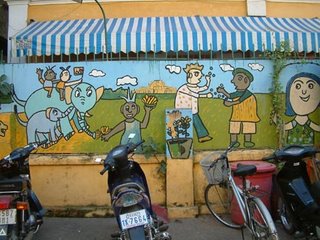A Long, Productive Stop Over

(Outside Friends Cafe in Phnom Penh)
Sebastien Marot was on his way to Japan. He stopped off in Cambodia. Twelve years later he is still there. He never made it to Japan.
Some stop-over! In that time he has helped establish Friends International, got married, had a child, and is looking now at ways to replicate the Friends model in other countries. He was just back from a visit to Myanmar when I met him.
I asked Sebastian to give me an overview of Friends. One hour later he was still on the overview. It’s that comprehensive.
To summarise, Friends International look at ways of supporting street children and breaking the cycle which leads children to the streets in the first place. They run a number of projects. Their first and most established is Mith Samlanh (or ‘Friends’) in Phnom Penh, which provides vocational training, education, health and hygiene programmes, cultural activities and emotional support for street children and their families. They run a restaurant where young adults are trained in the service and catering sector. They have commercial units including a shop where goods from the training units (clothes, jewellery, bags. About 1800 children are supported each day through the programmes.
But that is not all. Friends International also running a number of other projects which aim to ‘break the cycle’. One is a child protection programme, ChildSafe, which builds networks of community support which includes taxi drivers, hotel operators, local authorities and tourists to protect children from abuse.
I could go on. I’ve been thinking about Friends considerably since meeting Sebastian. He spoke with clarity about understanding the system which results in having children on the streets. Prevention starts with family, so that’s where their programmes start. Through the shop outlet, Mith Samlanh can guarantee a decent wage to a family. But for their goods to be supplied to the shops, parents must sign a contract which states that they will send their children to school. Break the contract, no income. It’s a positive incentive for all. With an income, the families are given incentives to look after their children. More kids in school, less on the streets. Sounds like a good deal to me.


0 Comments:
Post a Comment
<< Home